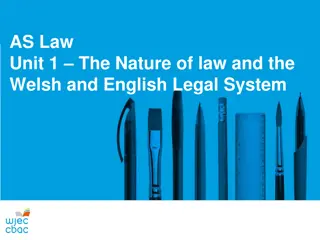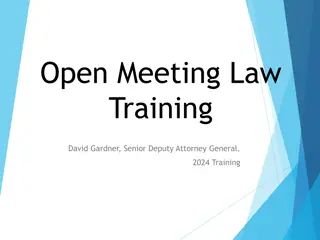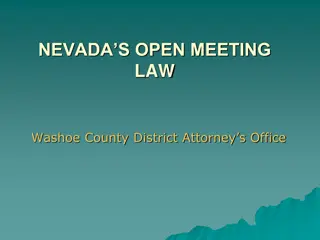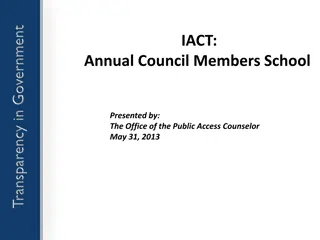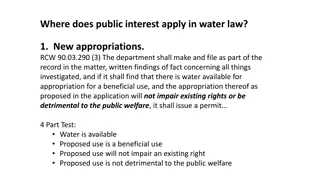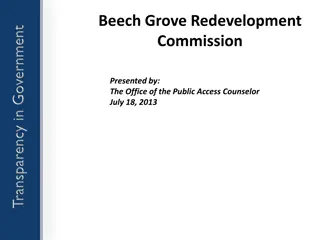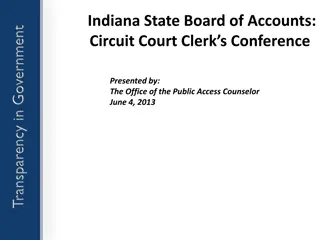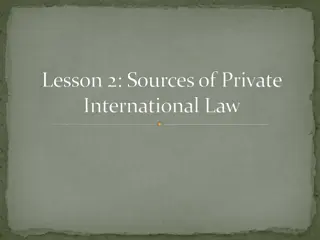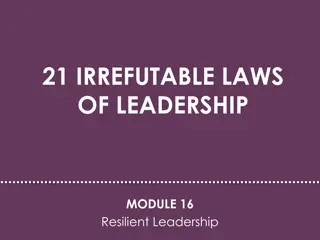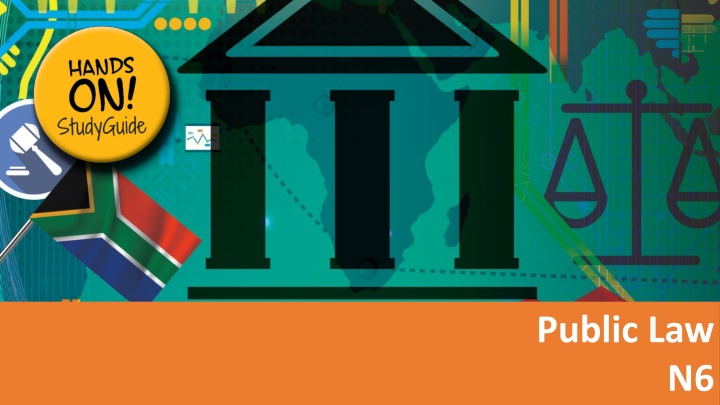
South African Law and Constitution: Historical Insights
Explore the evolution of South African law and constitution, from Roman-Dutch influences to indigenous traditions. Learn about the sources that shape South African law and the development of its constitutional framework. Gain insights into the types of law, including international, national, subjective, and substantive law.
Download Presentation

Please find below an Image/Link to download the presentation.
The content on the website is provided AS IS for your information and personal use only. It may not be sold, licensed, or shared on other websites without obtaining consent from the author. If you encounter any issues during the download, it is possible that the publisher has removed the file from their server.
You are allowed to download the files provided on this website for personal or commercial use, subject to the condition that they are used lawfully. All files are the property of their respective owners.
The content on the website is provided AS IS for your information and personal use only. It may not be sold, licensed, or shared on other websites without obtaining consent from the author.
E N D
Presentation Transcript
Public Law N6
Module 1 The concepts of law and Constitutional Law THE CONCEPT OF LAW The characteristics of law can be summarised as follows: It is a set of rules or regulations that facilitates human interaction. It ensures order in society and ensures that the law is applied consistently. The rules/laws are applied or interpreted by institutions of the state with assistance from institutional authorities. www.futuremanagers.com
Module 1 The concepts of law and Constitutional Law (continued) TYPES OF LAW Law can be categorised into: International Law; and National Law. National laws can be split into: Subjective Law (such as the law of Criminal Procedure; and Substantive (or material) Law. Substantive Law can be split into: Public (such as constitutional Law) ;and Private (such as family Law). www.futuremanagers.com
Module 2 Historical review of South African Law and the sources of South African Law INTRODUCTION South African Law is often referred to as Roman-Dutch Law , which is a combination of the two law systems, but the South African Law was also influenced by British Law and the indigenous law of the many African people in South Africa with their own tribal customs and traditions. www.futuremanagers.com
Module 2 Historical review of South African Law and the sources of South African Law (continued) DEVELOPMENT OF SOUTH AFRICAN LAW The history and development of South African Law can be illustrated using the diagram: www.futuremanagers.com
Module 2 Historical review of South African Law and the sources of South African Law (continued) SOURCES OF SOUTH AFRICAN LAW South African Law have the following sources: The Constitution which has the following sources: Legislation (statutes) Common law Predecent (verdicts/court decisions Customary law/tradition Indigenous law Authors; Modern textbooks; and Foreign law. www.futuremanagers.com
Module 2 Historical review of South African Law and the sources of South African Law (continued) DEVELOPMENT OF SOUTH AFRICAN CONSTITUTIONAL LAW In South Africa, Parliament is the highest legislative body on national level. Provincial legislature pass ordinances and municipal councils pass by-laws on local level. Parliament passes legislation when: There are gaps in the law; The law no longer satisfy the needs of the community; and There are defects or loopholes in existing legislation. www.futuremanagers.com
Module 2 Historical review of South African Law and the sources of South African Law (continued) AUTHORS AND MODERN TEXTBOOKS AND LITERATURE Modern academics and other lawyers write books and articles in journals on the law, which are useful sources of law. Modern textbooks are not regarded as binding in South Africa, but do influence the law and courts. In these books, expert jurists give detail explanations of legal rules and parts are often quoted in court and are later accepted and regarded as binding. www.futuremanagers.com
Module 2 Historical review of South African Law and the sources of South African Law (continued) FOREIGN LAW/INTERNATIONAL LAW Foreign law cover a variety of subjects such as: Diplomatic relations; Air traffic between states; The use of open sea; International principles with regard to human rights; and Laws relating to warfare. www.futuremanagers.com
Module 3 Subjective laws OBJECTIVE SENSE (POSITIVE LAW) Objective sense regulates the relationship between persons through the rules of Private Law where it is concerned with the relationship between equals on a horizontal level. The purpose of objective sense is to harmonise the relationship between persons in such a way that society will be orderly and peaceful. www.futuremanagers.com
Module 3 Subjective laws (continued) SUBJECTIVE RIGHT Subjective rights can be found in two kinds of relationships: A relationship between the legal subject and a legal object; and A relationship between a legal subject and other legal subject. www.futuremanagers.com
Module 3 Subjective laws (continued) LEGAL OBJECTS OF SUBJECTIVE LAWS The difference between four different subjective rights that a legal subject (person) can have with respect to recognised legal objects: Real rights (cases): rights with respect to movable and immovable property; Aspects of personality (personal property): a person s character; Intellectual property (Immaterial property): the spiritual or psychological creations of the human mind. Performance: human conduct called the law of demand. www.futuremanagers.com
Module 3 Subjective laws (continued) SUMMARY Objective sense rules the relationship between persons by means of the rules of Private Law that order our daily lives. Private Law regulates the relationship between legal subjects through the concept of subjective rights. Objective sense regulates the relationship between legal subjects through the concept of subjective rights. www.futuremanagers.com
Module 4 Classification of law and the different courts INTRODUCTION Law includes everything concerning human activity but there is no perfect or ideal classification of the law. The Romans classified the law into different disciplines and branches, but authors differ as to exactly where some divisions of law fit into the classification. www.futuremanagers.com
Module 4 Classification of law and the different courts (continued) NATIONAL LAW National Law is divided into: Material Law; Private Law; and Public Law. www.futuremanagers.com
Module 4 Classification of law and the different courts (continued) THE CLASSIFICATION OF COURTS AND COURT CASES Courts are institutions that apply the law on a daily basis. There are different court cases, such as: Criminal cases; Civil cases; and Constitutional matters. www.futuremanagers.com
Module 4 Classification of law and the different courts (continued) HIGHER COURTS Constitutional Court; Supreme Court of Appeal; High Courts; and Special higher courts. www.futuremanagers.com
Module 4 Classification of law and the different courts (continued) LOWER COURTS Water Tribunal/Water Court; Divorce Court; Equality Court; Courts of Chiefs and Headmen (Chief s Courts); Regional Court; and Magistrate s Court. www.futuremanagers.com
Module 5 Legal functionaries and court officials NATIONAL PROSECUTING AUTHORITY (NPA) The office of the NPA consists of: National Director of Public Prosecutions (NDPP); Four Deputy National Directors of Public Prosecutions; and Directors and Special Directors who head the: Sexual Offences and Community Affairs Unit (Soca); Special Commercial Crimes Unit (SCCU); Asset Forteiture Unit (AFU); Priority Crimes Litigation Unit (PCLU); and Office for Witness Protection (OWP). www.futuremanagers.com
Module 5 Legal functionaries and court officials (continued) STATE ATTORNEY (PREVIOUSLY THE GOVERNMENT ATTORNEY) The State Attorney s major function is to protect the interests of the state by acting for all government departments and administrations in civil cases, and for officials sued in their official capacity. They compile documents, compile contracts and receive money for the state. www.futuremanagers.com
Module 5 Legal functionaries and court officials (continued) MASTER OF THE HIGH COURT A Master of the High Court is appointed for every provincial division of the High Court of South Africa by the Minister of Justice and Constitutional Development. The Masters and their staff are specialists in the field of the administration and their role in the effective and rapid settlement of those matters is essential. www.futuremanagers.com
Module 5 Legal functionaries and court officials (continued) REGISTRAR OF THE HIGH COURT A Registrar of the High Court is responsible for the administration and documentation in the High Court. Their functions include: Administrative duties to compile case lists, arrange available courts, lend assistance to judges in general and keep records; Semi-judicial duties such as issuing summons, warrants, subpoenas; and Acting as taxing-master for that particular High Court division. www.futuremanagers.com
Module 5 Legal functionaries and court officials (continued) RESITRAR OF DEEDS The Registrar of Deeds is an independent directorate within the Department of Land Affairs. It is responsible for the registration, management and maintenance of the property registry of South Africa. Each Deeds Office operates independently from one another and is responsible for the registration and management of deeds information for their specific area. www.futuremanagers.com
Module 5 Legal functionaries and court officials (continued) RESITRAR OF COMPANIES The Registrar of Companies is responsible for: The registration of private and public companies; and The administration of the register of registered companies. Documents regarding companies are available for public scrutiny. www.futuremanagers.com
Module 5 Legal functionaries and court officials (continued) SHERIFF OF THE COURT (BAILIF) The Sheriff and Deputy Sheriffs are impartial and independent officials of the court appointed by the Minister of Justice and Constitutional Development. The Sheriffs task is to serve or execute all documents issued by our High Courts. www.futuremanagers.com
Module 5 Legal functionaries and court officials (continued) PUBLIC PROTECTOR The Public Protector was set to receive and investigate complaints from the public against government agencies or officials, and has the power to recommend corrective action and to issue reports. The Public Protector is appointed by the President, on the recommendation of the National Assembly, for a non-renewable period of seven years. www.futuremanagers.com
Module 5 Legal functionaries and court officials (continued) OFFICIALS OF THE COURT Public Prosecutors; Legal representatives; Judges; Translators; Magistrates; Messengers of the Court; Commissioners; Court orderlies; Commissioners of the Small Claims Clerks of the Court; and Court; Assessors. www.futuremanagers.com
Module 6 Doctrines of law and the Rule of Law THE DOCTRINES OF LAW The sovereignty doctrine: to have an independent authority over a geographic area. The doctrine of the division of powers is is a separation of the three main authorities of government, namely; legislative, executive and judiciary. www.futuremanagers.com
Module 6 Doctrines of law and the Rule of Law (continued) THE RULE OF LAW The Rule of Law is the principle that no one is above the law. It is not a legal rule, but it is an important principle in our judicial system. www.futuremanagers.com
Module 7 Civil liability of the state CIVIL LIABILITY OF THE STATE ACCORDING TO PRIVATE LAW The state must be held responsible for unlawful actions by its officials or the honouring of contracts. There is no difference between the official and the state and the suit will be against the executive institutions where the unlawful act happened. The executive institution must have their own disciplinary procedures in place to deal with the official who committed the unlawful act. www.futuremanagers.com
Module 8 Administrative Law and the principle of legality INTRODUCTION TO ADMINISTRATIVE LAW South African Administrative Law is the branch of Public Law, which regulates the activities of bodies that exercise public powers or perform public functions. Administrative Law aims for administrative efficiency, and for control measures, so that no abuse may occur. www.futuremanagers.com
Module 8 Administrative Law and the principle of legality (continued) ADMINISTRATIVE LAW The Promotion of Administrative Justice Act 3: Sets out the general rules for the proper performance of all administrative action; Requires reasons for administrative action in certain circumstances; Requires administrators to inform people about their rights to review or appeal and to request reasons; and Sets out the remedies that are available if these rules are not followed. www.futuremanagers.com
Module 8 Administrative Law and the principle of legality (continued) THE PRINCIPLE OF LEGALITY The principle of legality is laid down by the Constitution and provides that: Everyone has the right to administrative action that is lawful, reasonable and procedurally fair; Everyone whose rights have been adversely affected by administrative action have the right to be given written reasons; and National legislation must be enacted to give effect to these rights. www.futuremanagers.com
Module 9 Sources of Administrative Law SOURCES OF SOUTH AFRICAN ADMISTRATIVE LAW The Constitution; Legislation (statutes); Legal verdicts or precedent (court decisions); Common law; Customs or administrative practices; Indigenous law; and Works of modern authors. www.futuremanagers.com
Module 10 Administrative relationships INTRODUCTION A legal relationship is formed between two legal subjects and the agreement is legally enforceable only if the contracting parties may be deemed by the court to have intended it. A relationship between a male and female becomes legal if they get married. www.futuremanagers.com
Module 10 Administrative relationships (continued) TYPES OF LEGAL RELATIONSHIPS Private Law relationship which is formed where individuals (legal persons) enter into a contract/ agreement and are thus involved in a legal relationship; and An Administrative Law relationship which can take place between a government body and an individual/company or between government bodies. www.futuremanagers.com
Module 10 Administrative relationships (continued) SUBJECTS AND OBJECTS IN A RELATIONSHIP A legal subject is an administrative government body or an individual or organisation who enters into a legal relationship with another legal subject. It is the parties involved in a Private Law or Administrative Law relationship. www.futuremanagers.com
Module 11 Internal governmental relations and delegation of authorities INTRODUCTION Internal governmental relations take place between government organs. One organ will have higher authority than the other and when the higher organ gives an instruction to the lower organ, an administrative legal relationship develops. www.futuremanagers.com
Module 11 Internal governmental relations and delegation of authorities (continued) DELEGATION OF ADMINISTRATIVE AUTHORITY/POWERS Delegation happens where: One person or body holds the power and authorises another person of body to exercise the power or function on their behalf. The holder of the power stays responsible for the acts of the person or body who will then exercise the power or function delegated to them. The power is transferred from the higher person or body to a lower person or body. www.futuremanagers.com
Module 12 Administrative proceedings INTRODUCTION The state manages the public affairs of the country and is made up of many organs of state that are responsible for the management and administration of the state. This can be divided into four areas: The legislature; The judiciary; The executive; and The administration. www.futuremanagers.com
Module 12 Administrative proceedings (continued) ADMINISTRATIVE PROCEEDINGS Legislative administrative proceedings are the decisions taken by legislative bodies to carry out administrative action. The PAJA makes provision for remedies for people affected by administrative decision with regard to the judicial administrative proceedings. Purely administrative proceedings are decisions connected with the daily or ordinary business of government. www.futuremanagers.com
Module 13 Judicial control INTRODUCTION Judicial control or is the control, organisation and conduct of government administration regarding the validity of administrative proceedings. Four forms of control can be exercised with regard to administrative proceedings, namely internal control, control by parliament; investigation by the Public Protector or a parliamentary official; and control by the judiciary. www.futuremanagers.com
Module 13 Judicial control (continued) JUDICIAL CONTROL Judicial control is the right that people have to ask a court to review administrative action that they do not agree with. Any person who is unhappy with an administrative decision or action can challenge the decision or action in a court, tribunal or forum. There, they can argue that the decision is a violation of the rights to just administrative action. www.futuremanagers.com
Module 13 Judicial control (continued) CONCLUSION If the judicial authority finds that the decision is unlawful, unreasonable or procedurally unfair, it can make any of the following possible orders to rectify the situation: An order declaring the administrator s decision invalid; Ordering the administrator to reconsider the decision; Replacing the decision with the court s own decision; Ordering the government to pay damages to the affected person. www.futuremanagers.com
Module 14 Interpretation of laws INTRODUCTION The interpretation of statutes, or the judicial understanding of legislation, deals with the principles and rules used to determine the correct meaning of legislative provisions to be applied in a practical situation. www.futuremanagers.com
Module 14 Interpretation of laws (continued) FUNDAMENTAL RULES The fundamental rules with regard to the interpretation of laws/legislation are as follows: Interpret the law literally; Words must be taken to have their ordinary meaning; Common words must be interpreted in their common usage; The interpreter may not step outside the wording of the law; and Each word must have a meaning/Every word is important. www.futuremanagers.com
Module 14 Interpretation of laws (continued) GOLDEN AND LITERAL RULE OF INTERPRETATION The golden rule of interpretation means that the interpreter must determine the intention of the legislator (the true meaning of the legislator should be followed). The literal rule of interpretation means that the interpreter must follow the meaning of the legislator as presented by the words of the law. www.futuremanagers.com
Module 15 Aids in the interpretation of laws INTERNAL AIDS Legislative text in another official language; Original legislation and another legislation text; Preamble/preface; The long title/elaborated title; The definition clause/Article of definition of words; Addenda/schedules. www.futuremanagers.com
Module 15 Aids in the interpretation of laws (continued) EXTERNAL AIDS The Constitution; Preceding discussions/deliberations at the acceptance of the law; Peripheral circumstances or surrounding circumstances; Dictionaries and linguistic evidence; Explanatory memoranda, examples and footnotes; Earlier and later laws; Ingrained customs interpretations; and textbooks. www.futuremanagers.com
Module 15 Aids in the interpretation of laws (continued) THE INTERPRETATION ACT (THE LAW OF INTERPRETATION) If the word persons is used in a law, it includes councils, town council, municipal council, a company with legal personality, any body of people with or without legal personality. If a number of days are stipulated in a law when calculating it, the first day is excluded and the last day is included. Sundays and public holidays are excluded when days are counted. www.futuremanagers.com





